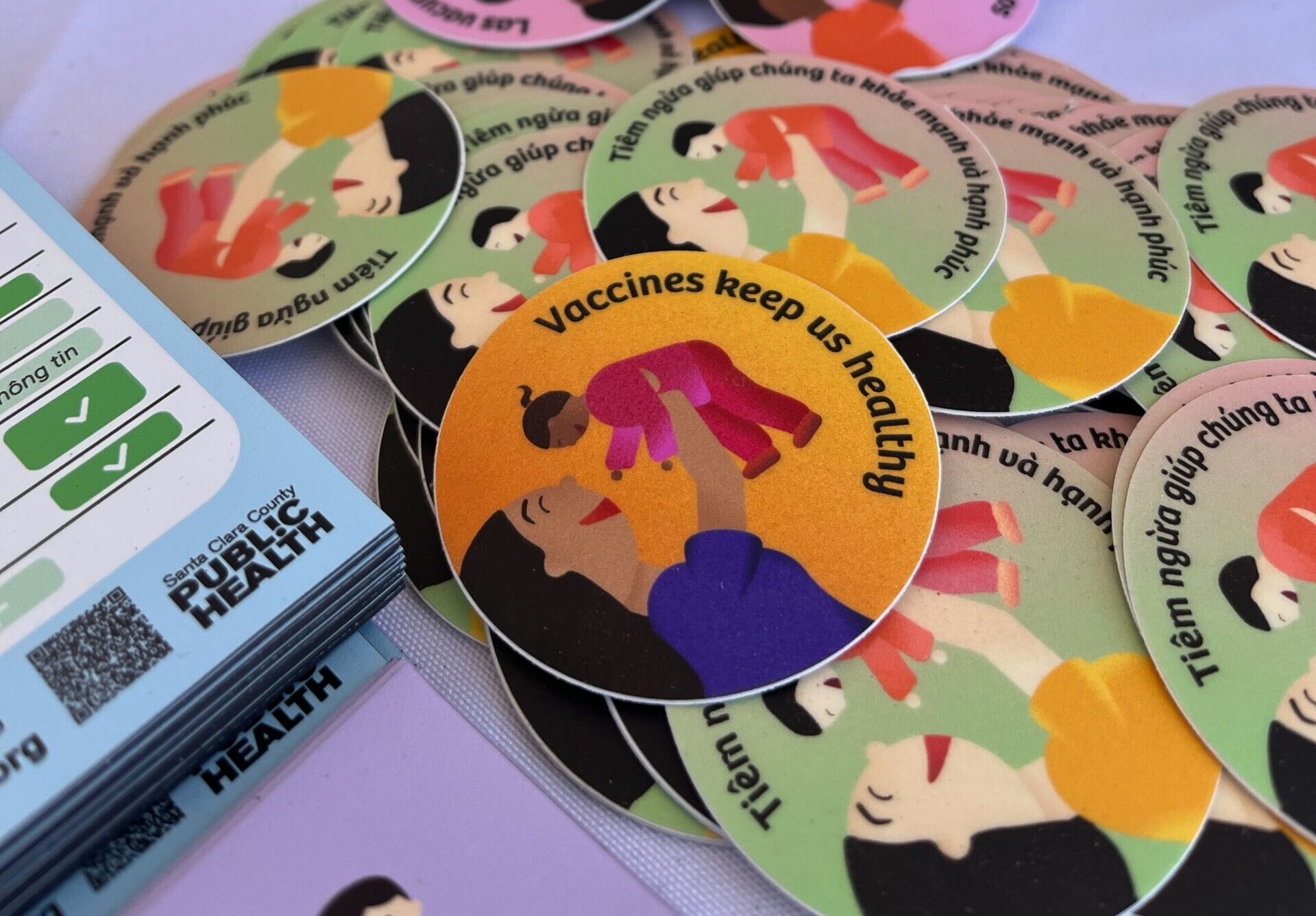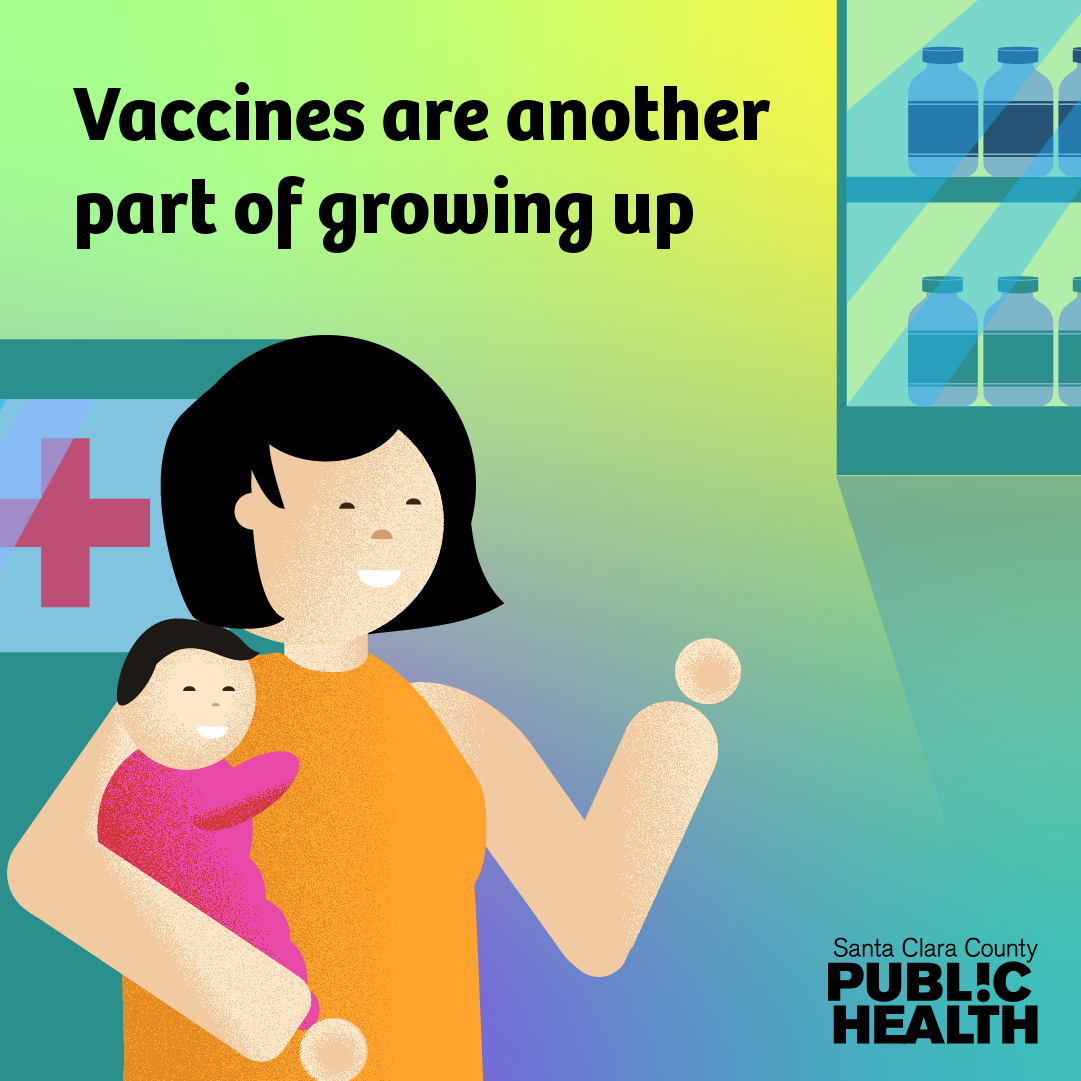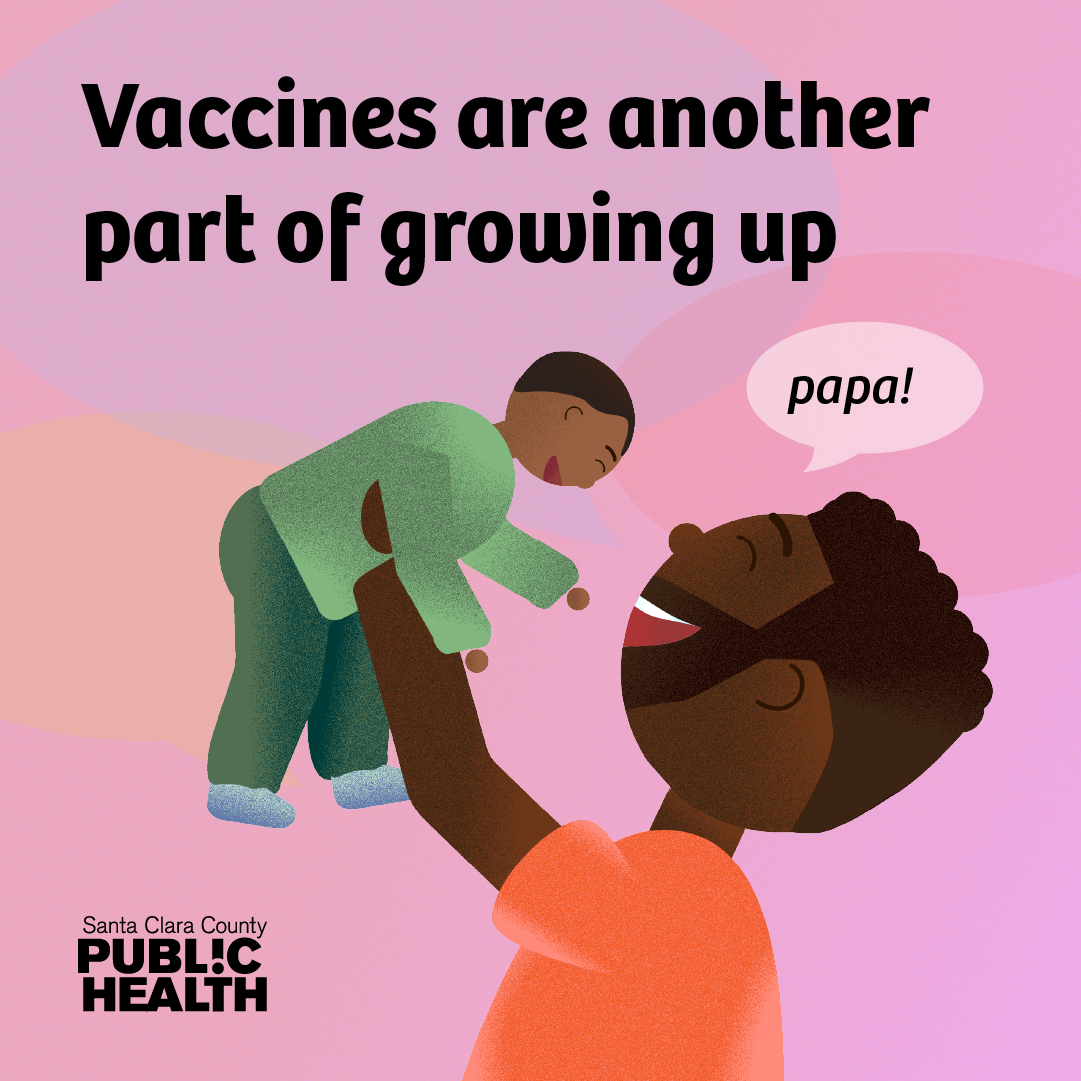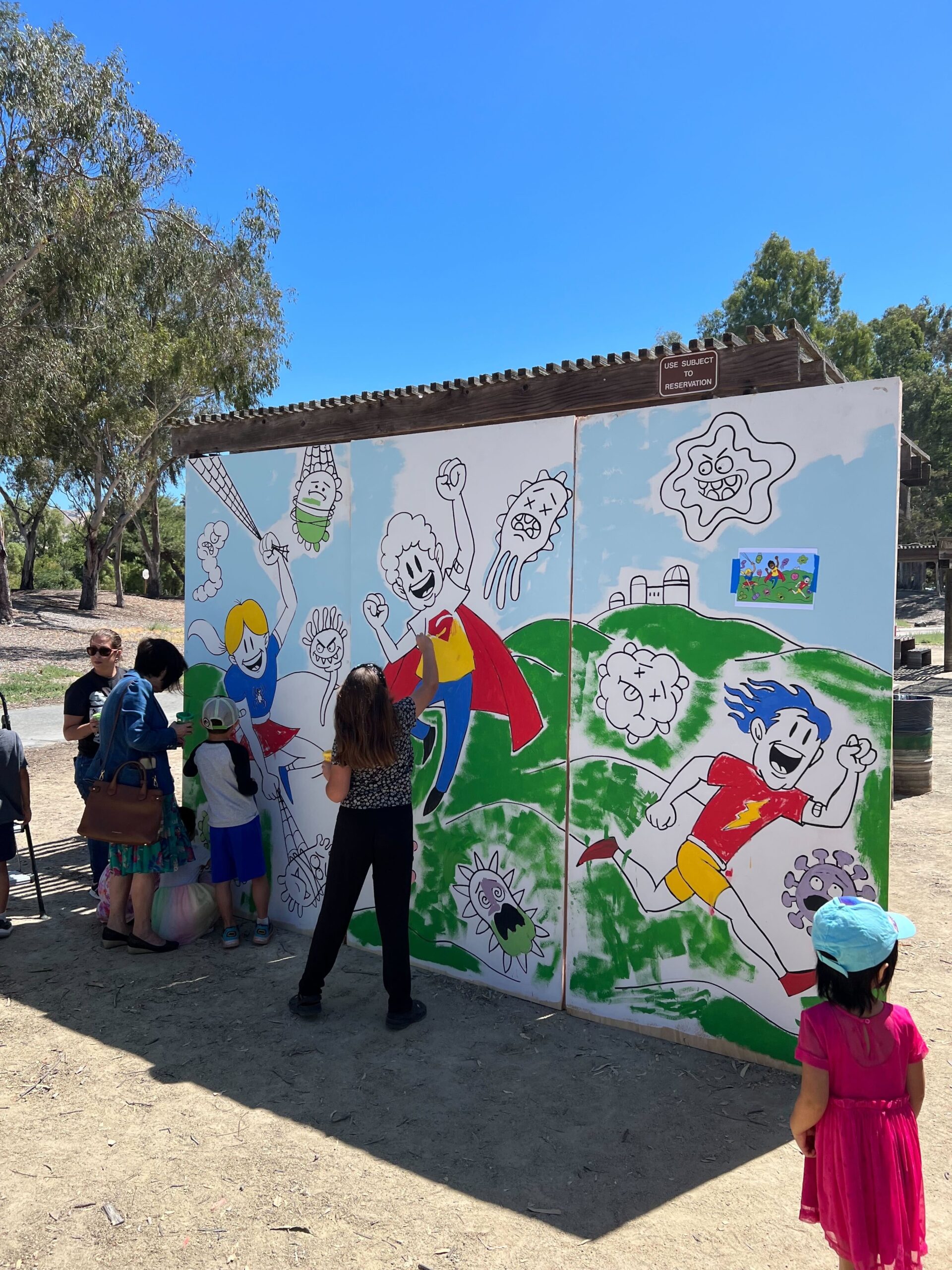The Big Catch Up: Health Communications team encourages routine childhood vaccinations in Santa Clara County
By Clancey Bateman and Jessica Holli
 Since the beginning of the COVID-19 pandemic, vaccination rates among school-age children, including for vaccine-preventable diseases like measles and whooping cough, have fallen in the United States. While some of this can be attributed to children missing regular checkups with health care providers during the early days of the pandemic, misinformation and disinformation about vaccines—particularly COVID-19—may be fueling this continued decline in vaccination rates. Recent CDC data indicate that the percentage of kindergarteners vaccinated against measles, mumps, and rubella (MMR); diphtheria, tetanus, and acellular pertussis (DTaP); and varicella—all required for school entry—declined from 95% in 2019–2020 to 93% in 2021–2022, under the required level to prevent community transmission of some of these viruses.
Since the beginning of the COVID-19 pandemic, vaccination rates among school-age children, including for vaccine-preventable diseases like measles and whooping cough, have fallen in the United States. While some of this can be attributed to children missing regular checkups with health care providers during the early days of the pandemic, misinformation and disinformation about vaccines—particularly COVID-19—may be fueling this continued decline in vaccination rates. Recent CDC data indicate that the percentage of kindergarteners vaccinated against measles, mumps, and rubella (MMR); diphtheria, tetanus, and acellular pertussis (DTaP); and varicella—all required for school entry—declined from 95% in 2019–2020 to 93% in 2021–2022, under the required level to prevent community transmission of some of these viruses.
“Ensuring that children are up-to-date on all their vaccinations is critical, especially as children head back to school. By working with community stakeholders and providers throughout this campaign, we laid the groundwork for families to get caught up on necessary immunizations,” said JSI project director Jessica Holli.
Effective health communication helps instill confidence in the safety and efficacy of routine childhood vaccines and reduces vaccine hesitancy among parents and caregivers. This is why, in October 2022, the County of Santa Clara Public Health Department awarded JSI, in partnership with Circlepoint, a $1-million contract to design and implement a behavior change campaign in response to declining vaccination rates among children. While Santa Clara County, CA has historically had higher vaccination rates than the national and state average, overall rates have lagged in recent years, similar to national trends. Those most likely to fall behind on childhood vaccinations include children from low-income families of Latinx/Hispanic ethnicity and African/African ancestry, and older children.
Through community engagement and formative research, JSI found that vaccine uptake and hesitancy among local caregivers was affected by several factors, including misinformation that is often spread through social media and other digital platforms. People have a range of beliefs about vaccines, and while the vast majority of local caregivers readily accept them, some preferred a “wait and see” approach to the COVID-19 vaccine and planned to wait until they had a better understanding of its effects. JSI’s aim was to reach potentially persuadable caregivers through a compelling behavior change campaign.
Based on this research, JSI used the Transtheoretical Model of Health Behavior Change, more commonly known as the “Stages of Change” framework, to develop the campaign’s concept and key messages.(1) This framework posits that change “involves progress through six stages of change: precontemplation, contemplation, preparation, action, maintenance, and termination.” (2) A recent evaluation of the national “We Can Do It” campaign demonstrated the use of this framework to increase COVID-19 vaccine uptake. JSI created the Vaccines Are Another Part of Growing Up campaign to reach caregivers in the “moveable middle” (those in the contemplation, preparation, and action stages). The campaign featured messages in English, Spanish, and Vietnamese that likened routine childhood vaccinations to other positive childhood milestones like first words, birthdays, and soccer goals. This messaging: 1) normalized routine childhood vaccinations to increase feelings of safety and trust; and 2) associated routine childhood vaccinations with happy and healthy childhoods.



Artwork credit: Frankie McFly
Reaching busy caregivers required interactive and engaging strategies to help them learn about vaccine safety and efficacy. The campaign used a mix of advertising channels, including traditional (radio, television, and print); social and digital media; and posters in local stores. In addition, the campaign conducted outreach at local farmers’ and flea markets so that families could talk with public health and JSI staff, receive educational materials (like magnetic schedules of recommended vaccines), and participate in art activities. The campaign culminated in a mural-painting party at Lake Cunningham Park in San Jose. In partnership with Local Color, local artist Frankie McFly invited families to help paint a mural that featured virus-fighting superheroes and celebrated happy and healthy childhoods. The mural will be permanently installed in San Jose.
Recognizing that communication about vaccine safety and efficacy is most effective when reinforced by multiple voices, JSI developed two training curricula to complement the campaign. In May, 2023, JSI provided a series of trainings on addressing vaccine hesitancy and encouraging patient advocacy for community-based partners and community health workers and promotoras who regularly interact with local families.
Between April and July 2023, Vaccines Are Another Part of Growing Up reached a large number of Santa Clara County residents with messages about the importance of routine childhood vaccinations. Across all communication channels, the estimated total reach of the campaign was over 33 million impressions.
“Ensuring that children are up-to-date on all their vaccinations is critical, especially as children head back to school. By working with community stakeholders and providers throughout this campaign, we laid the groundwork for families to get caught up on necessary immunizations,” said JSI project director Jessica Holli. Effective and timely health communication is an important component of JSI’s domestic and global efforts to respond to the COVID-19 pandemic. Learn more about messaging strategies to encourage vaccination.
This blog appeared first on JSI.com.
1. Prochaska JO, Velicer WF. The transtheoretical model of health behavior change. Am J Health Promot. 1997 Sep-Oct;12(1):38-48. doi: 10.4278/0890-1171-12.1.38. PMID: 10170434.
